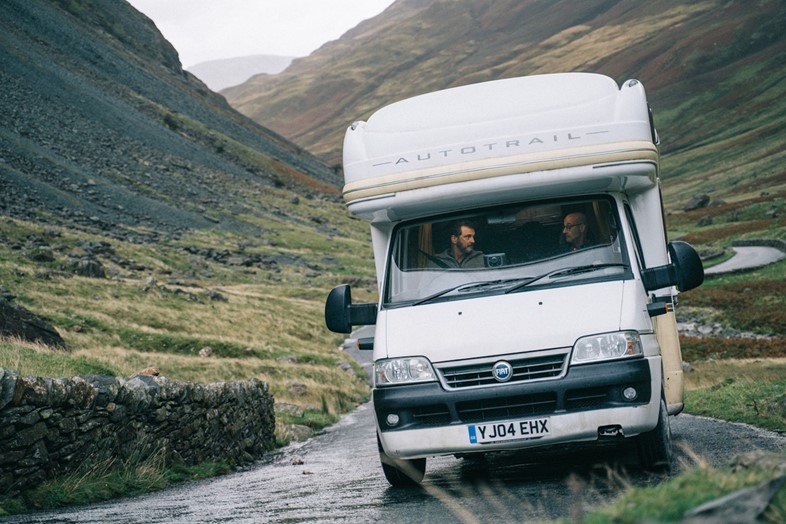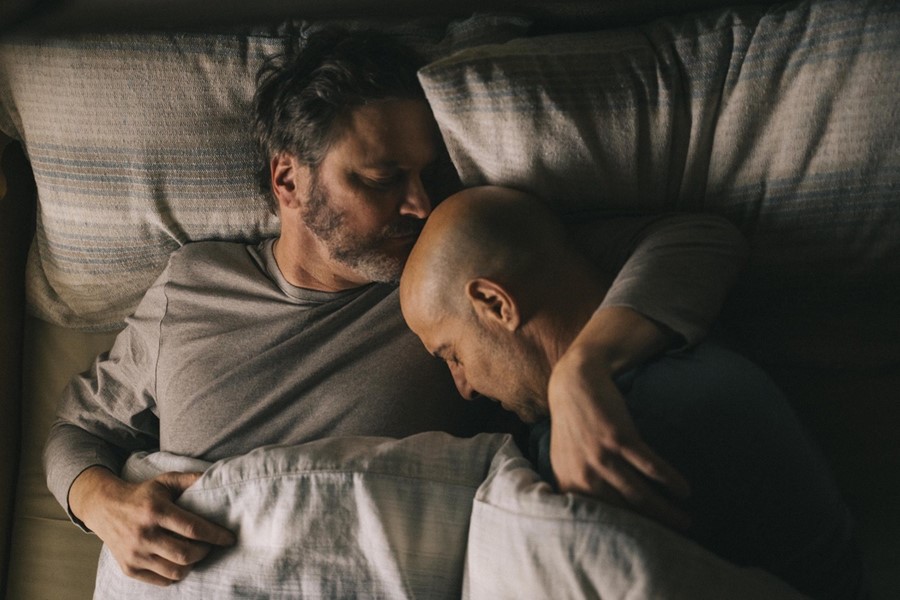Harry Macqueen opens up about his second feature film, Supernova, which examines how we love in the face of devastation
The first film Harry Macqueen directed, Hinterland (2014), was made on a budget of £10k, while he was living in a friend’s garden shed. This is no secret: it’s brought up whenever anyone writes about Macqueen – because it’s the antithesis of the moneyed and glamorous mirage the mere mention of making movies evokes, but also because the necessity of discomfort and sacrifice to make art is an enduringly popular trope.
And Macqueen, 37, is no glossy Hollywood show pony – he’s a workhorse who does little to hide that his career as an actor, writer and director has been varied. He has worked on acclaimed movies (Me and Orson Welles, Provenance), but also experienced the humdrum service industry reality that often goes with the territory: “Doing that classic actor thing of spending my whole life working in bars thinking about my life choices.”
Macqueen’s second film behind the camera, Supernova, is the story of talented novelist, Tusker, who has dementia. He and his partner of some 20 years, musician Sam, embark on a camper van road trip through the Lake District – heavy with the knowledge that the former’s health is deteriorating. And while Hinterland and Supernova have plenty in common – a road trip, an intense relationship, awing shots of unspoilt but slightly damp-looking English utopias, and earthy ‘cottagecore’ aesthetics: knit jumpers, dry stone walls, and hiking boots – Supernova has the benefit of an A-list cast.
When asked whether bagging Stanley Tucci and Colin Firth (playing Tusker and Sam respectively) was more than he could have hoped for, Macqueen has the startled look of someone who found a winning scratch card down the back of a bus seat. But the reality is that both Tucci and Firth fell in love with his script and put their faith in him to deliver. “They committed so totally to the project – they fell in love with it right from the start,” he says. “They knew it was a film that was trying to be greater than the sum of its parts. It could have definitely gone another way with other famous actors but with them it felt very normal, very quickly.”

Filming took place over a six-week period in the Lake District, during which time the entire cast and crew lived in a remote holiday park. “We had nowhere to go so we all just hung out. You had to drive to go to a pub. We were in this place doing our own thing. We drank Stanley’s cocktails, ate his food and spent time together and it was really lovely.” It sounds totally idyllic. “Yes, but also it was awful,” he laughs. “It was the hardest thing I’ve done in my life, times a thousand.”
As well as the heavy-duty logistics that come with writing and directing any film, Macqueen had the added responsibility of navigating heavy and complex themes. The seedlings of Supernova came from an experience he had working with a woman in her fifties who changed dramatically during the same period. She was later diagnosed with early onset dementia and died. “I was profoundly moved by it and I started volunteering for dementia charities,” says Macqueen, “eventually working with dementia specialists at UCL hospital spending time with people living with early onset dementia and their loved ones.”
Macqueen’s treatment of dementia in Supernova is gentle without being overly sentimental. The pressure to represent such a frightening and decimating illness in the right way was something he felt deeply throughout the entire process. “You have a moral obligation to get this right for the people that it affects so yeah it’s a massive undertaking,” he says. “If the film had been a total disaster but an accurate portrayal of [dementia] that would have been OK.”
His rendering of aging is also beautifully approached, in a world where romance and sex belong to the beginning of things and are the domains of the young, nubile and unblemished. The relationship at the heart of Supernova is between two people who are not only older but also hurtling towards an ending. Not only this but they are the same sex. “A lot of LGBTQ+ cinema understandably and brilliantly is about the process of coming out or the evolution of your sexual being,” he says. “But it seems to me that there wasn’t a huge amount of films about romantic love later on in life if you are the same sex.”
The portrayal of Tusker and Sam is tender: a relationship based on respect and romance. But that they are a gay couple is incidental to the narrative – something Macqueen intended. “I’m really proud of the fact that the film represents same-sex love in the way that it does,” he says. “The film doesn’t mention their sexuality, no one ‘flags’ it up – it is just presented as is. That’s quite revolutionary in its own quiet way.”
Macqueen recalls a recent conversation with a Polish journalist who told him that the presentation of Tusker and Sam’s relationship is completely alien in Polish society. Meanwhile Studio Canal had to pull the film in Russia for a while because authorities there were trying to edit to cut out references to homosexuality. It doesn’t matter that this is shocking. This reality is precisely why films like Supernova must be made. “I hope the film inspires people from the LGBTQ+ community and it educates people who aren’t from that community. I think it does that by being quite quiet, subtle and natural.”
Macqueen’s script reflects this – he isn’t given to theatrical verbosity or posturing monologue, rather leans into the silences of characters who are comfortably familiar with one another. It is a low-key, quiet approach – which speaks to actors feeling rather than performing.
If a supernova is, as defined by NASA, a “large explosion that takes place at the end of a star’s life cycle” – then Supernova seeks to echo this intensity and achieves it. “The film is about the nature of how we love each other and what we hold dear when things are difficult. I hope it resonates in a life affirming way.”
Supernova opens in UK cinemas on 25 June.
